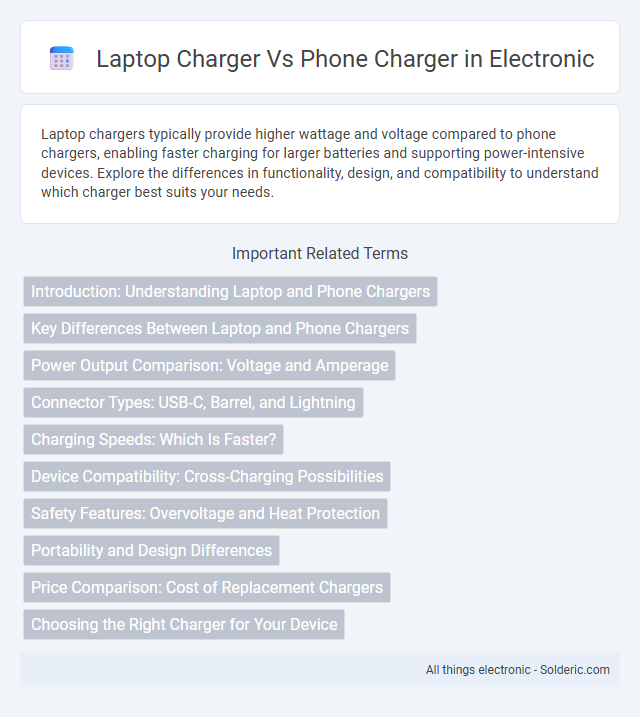Laptop chargers typically provide higher wattage and voltage compared to phone chargers, enabling faster charging for larger batteries and supporting power-intensive devices. Explore the differences in functionality, design, and compatibility to understand which charger best suits your needs.
Comparison Table
| Feature | Laptop Charger | Phone Charger |
|---|---|---|
| Power Output | 45W to 100W+ | 5W to 30W |
| Connector Type | USB-C, Proprietary (e.g., MagSafe) | USB-C, Micro-USB, Lightning |
| Voltage | 19V to 20V typical | 5V to 9V typical |
| Current | 2A to 5A | 0.5A to 3A |
| Size & Weight | Larger, heavier | Compact, lightweight |
| Usage | High-power devices, longer charge times | Small devices, quick charging |
| Price Range | $30 to $100+ | $5 to $30 |
| Compatibility | Model-specific or USB-C universal | Widely compatible across phone brands |
Introduction: Understanding Laptop and Phone Chargers
Laptop chargers typically deliver higher wattage, ranging from 45W to 100W or more, compared to phone chargers that usually provide between 5W and 30W, optimizing power delivery for larger batteries. The charging connectors for laptops often include USB-C or proprietary plugs, while phones mostly use USB-C or Lightning connectors, affecting compatibility and charging speed. Your device's power requirements and connector type determine the charger needed to ensure efficient and safe charging.
Key Differences Between Laptop and Phone Chargers
Laptop chargers typically deliver higher wattage, ranging from 45W to over 100W, to support the greater power needs of laptops, whereas phone chargers usually provide between 5W and 30W. Laptop chargers often use larger connectors like USB-C or proprietary adapters, while phone chargers commonly feature USB-A or USB-C ports tailored for compact devices. Understanding these key differences ensures you use the correct charger for your device, optimizing charging speed and safety for your electronics.
Power Output Comparison: Voltage and Amperage
Laptop chargers typically deliver higher voltage and amperage compared to phone chargers, often ranging from 19V to 20V with 3A to 5A current, enabling faster and more powerful charging for larger batteries. Phone chargers usually operate at 5V with amperage varying from 1A to 3A, optimized for smaller devices with lower power requirements. Understanding your device's power output specifications ensures efficient charging and prevents potential damage caused by incompatibility.
Connector Types: USB-C, Barrel, and Lightning
Laptop chargers often use USB-C or barrel connectors, with USB-C becoming the industry standard for fast charging and data transfer across many modern laptops. Phone chargers primarily utilize USB-C connectors for Android devices and Lightning connectors exclusively for Apple iPhones. Compatibility and power delivery differ significantly; USB-C supports higher wattages suitable for laptops, while Lightning connectors are optimized for Apple's mobile devices with proprietary technology.
Charging Speeds: Which Is Faster?
Laptop chargers typically deliver higher wattage, often ranging from 45W to 100W or more, enabling faster charging speeds compared to phone chargers, which usually provide between 5W and 30W. The increased power output of laptop chargers supports rapid battery replenishment for larger capacities, while phone chargers prioritize compatibility and safety with smaller batteries. Fast charging technologies like USB Power Delivery enhance charging speeds across both devices, but laptop chargers remain superior in delivering swift energy transfer due to their higher power ratings.
Device Compatibility: Cross-Charging Possibilities
Laptop chargers and phone chargers have different voltage and wattage requirements that affect device compatibility and cross-charging possibilities. While some modern USB-C laptop chargers can charge phones efficiently due to Power Delivery (PD) standards, most phone chargers lack the power capacity to charge laptops safely or effectively. Understanding your device's charging protocol ensures optimal performance and prevents potential damage when attempting cross-charging.
Safety Features: Overvoltage and Heat Protection
Laptop chargers typically incorporate advanced safety features such as overvoltage protection and heat dissipation mechanisms to prevent damage from electrical surges and overheating, ensuring long-term device safety. Phone chargers also include these protections, but they may be less robust due to lower power requirements, making it essential to use a charger specifically designed for your device to avoid potential hazards. Prioritizing charging equipment with certified safety standards helps protect your gadgets from electrical risks and prolongs battery life.
Portability and Design Differences
Laptop chargers are bulkier and heavier due to higher power requirements and larger power bricks, whereas phone chargers prioritize portability with compact, lightweight designs for easy daily carry. Laptop chargers often feature thicker cables and larger connectors to support faster charging and power delivery, contrasting with the smaller, more flexible cables of phone chargers. Your choice depends on balancing the need for power and convenience based on device usage and travel habits.
Price Comparison: Cost of Replacement Chargers
Replacement laptop chargers generally cost significantly more than phone chargers due to their higher power output and specialized connectors, with prices often ranging from $30 to $100 or more. Phone chargers, typically priced between $10 and $30, are more affordable and widely available, making replacements easier and less costly. When choosing a replacement, consider your device's power requirements to ensure compatibility and protect your investment.
Choosing the Right Charger for Your Device
Choosing the right charger for your device is essential to ensure optimal charging speed and battery health. Laptop chargers typically deliver higher wattage, often ranging from 30W to 90W or more, while phone chargers usually provide 5W to 25W, making compatibility critical to avoid damage. You should always use chargers specifically designed for your device model to maintain performance and safety standards.
Laptop charger vs Phone charger Infographic

 solderic.com
solderic.com